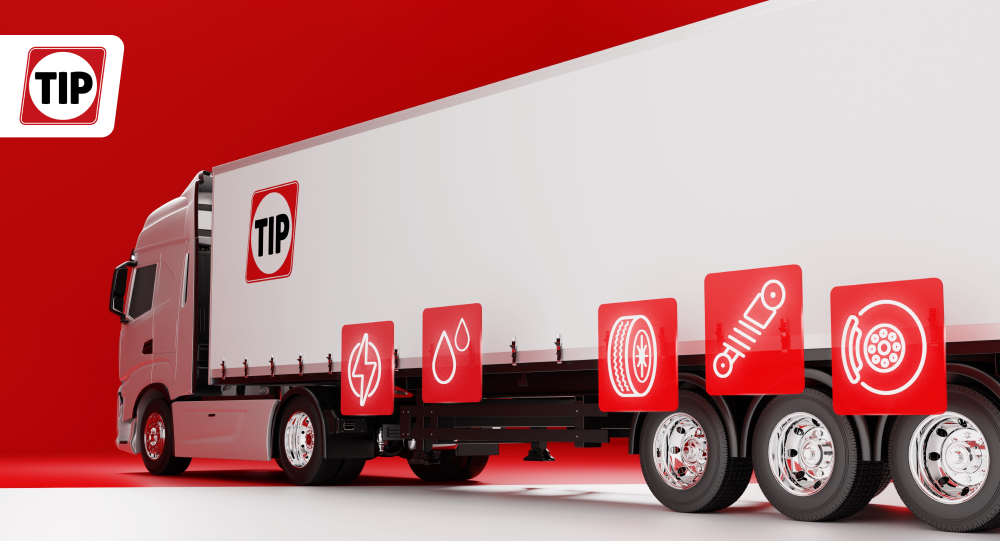Semi-Trailer Maintenance Tips
To ensure your business keeps running for the long haul, it is vital that your fleet remains functioning optimally all year round.
The logistics business can be demanding on the hardware of your trucks and trailers which is why a solid maintenance strategy is so important to keep your fleet operating in peak condition.
Here is a TIP-approved maintenance guide to help you keep your semi-trailers in perfect working condition at all times.

How often should you service your semi-trailer?
To preserve your semi-trailer’s longevity and effectiveness, it is recommended to follow your semi-trailer’s service manual. But a common rule of thumb is to perform a service on your semi-trailer every 6 months for a non-steered trailer and every 17 weeks for a steered trailer.
This is a good benchmark to use, however, you may need to perform a service sooner depending on the load type and operational frequency.
Pre-trip and post-trip inspections should also be carried out at each delivery to keep you aware of how your semi-trailer is performing at all times. This is to ensure any damages incurred on a trip are quickly fixed.
A common mistake some logistics partners make is to focus on truck maintenance while paying little attention to trailers. But it is important to remember that the success of each delivery hinges on the effectiveness of both – a truck is only as good as its trailer, and vice versa.
Semi-trailer maintenance checklist
A robust semi-trailer repair and service checklist is crucial for keeping your fleet operational and your customers happy. It will help you increase uptime and prevent costly repair issues along the way.
Whether you’re operating flatbeds, lowboys, reefers, or RGNs, they all experience similar maintenance issues to look out for.
Tires
Apart from regularly checking for any damage or wear and tear, it is important to monitor your tires’ air pressure. Correct air pressure is key to tire longevity so look after your inflation system as leaks commonly occur.
If you experience unusual tire wear it might be an indication that there is something wrong with your semi-trailer’s axle alignment, suspension, undercarriage, or shock absorbers. Regular trip inspections will allow you to see if any issues are beginning to form so you can handle them quickly.
Brake pad & Brake Lining
Well-functioning brakes are essential for road safety, so be sure to inspect your semi-trailer’s brake pads and brake lines for any signs of damage or corrosion. Ensure that the brakes are rapidly responsive by inspecting the gladhands (they must be tightly sealed).
Check the condition of your tire drums – if there is not enough material to last until the next service then it is advisable to change them immediately. While the frequency of brake changes depends on the type of trailer and its usage, it is advisable to inspect them regularly.
Lubricants and fluids
Using the correct lubricants in the right amount is essential to performance so check the trailer’s service manual for this information. Things like the lubricant’s grade, thickening system, and rating are all important when selecting the right one. Make sure the 5th wheel, main rail, kingpin, and drag link are well-greased at all times.
Make sure all the necessary fluid levels are consistently topped up, especially oils, for reefers and hydraulic steered trailers. Inspect the undercarriage of the trailer for any leaks and cracks, especially in refrigerated trailers.
Electrical
It is important to check that all electrical components in both your truck and trailer are functioning correctly – especially the connections between the two. Make sure all the lights and indicators are working before embarking on a haul. Remember to clean the lenses.
Check all the electrical wiring for damages and repair where needed. Generally, look out for any corrosion on the semi-trailer as it often targets electrical systems. Prevention is better than cure in this regard.
Pneumatic system
The pneumatic system is often overlooked during inspections. However, if any small issues are present they could have serious consequences for your semi-trailer’s pipes, tubes, and valves. Pneumatic fittings require regular maintenance, so ensure to visually inspect them as often as possible.
Study the machine’s schematic to know which pressure test point locations to inspect. Be sure to inspect the pneumatic air coupling systems for any damage and leakages, and always have spare fittings on hand.
Suspension
It is vital to visually inspect your semi-trailer’s suspensions regularly as it is important for ensuring road safety. Look for signs of cracks on the air springs, tears, and irregular wear. Nothing should be in contact with the suspension or hindering its full range of movement.
Make sure the air springs have enough pressure and are equal throughout. It is common for a semi-trailer’s ride height position indicators to become faulty over time so ensure the system is functioning correctly.
Top Tip: keep it clean!
Semi-trailers carry all sorts of different loads such as produce, chemicals, machinery and equipment, etc. so it is good practice to keep it clean. Cleaning the interior of your semi-trailer should be done after every delivery and exterior cleaning every few weeks.
Most importantly, regular cleaning helps against corrosion. If left unclean for some time, vital components of your truck could become faulty and impact the effectiveness of your trailer. So, keep it clean!
TIP Group Maintenance and Repair Services
TIP Group can offer lifecycle maintenance and repair on any vehicle purchased. Our teams of certified trailer technicians and Class A mechanics operate in state-of-the-art workshops across Europe and North America. Also, TIP’s Insight data can provide deep insight and analysis to support vehicle maintenance that helps reduce long-term risk.
Get in touch with us today and one of our regional managers will be happy to help arrange maintenance and repair services for you.



